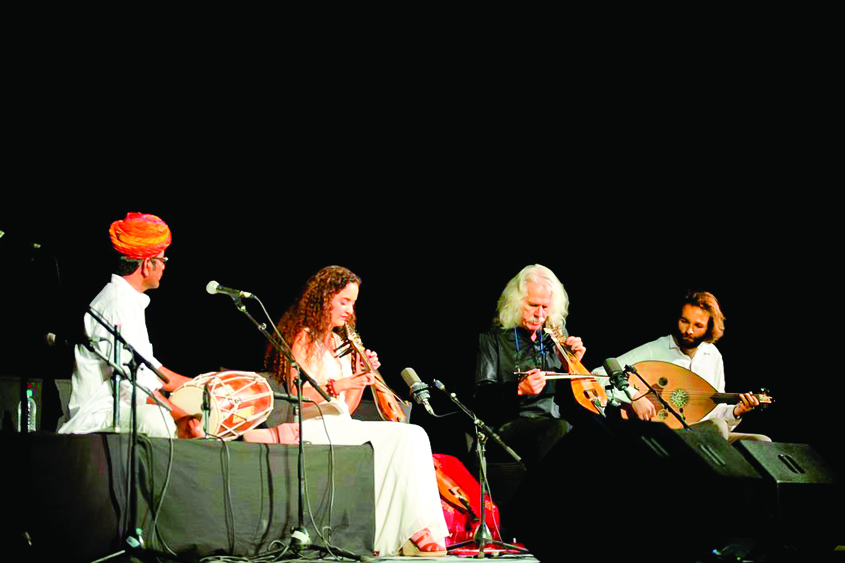The Jodhpur Rajasthan International Folk Festival (RIFF) was held at the Mehrangarh Fort, in Jodhpur, from 13-17 October. An initiative of the Mehrangarh Museum Trust and Jaipur Virasat Foundation, Jodhpur RIFF is held every year around the same time, so that it conincides with the sharad purnima — the brightest full moon of the year.
The five-day event reached its crescendo with back-to-back performances by Rajasthani folk and international musicians, running till late night and stretching into the wee hours with its scintillating dawn concerts. The ninth edition of the festival was aimed at popularising the folk singers and musicians of the region and giving them an international forum.
Speaking on the significance of Jodhpur RIFF, the patron of the festival Maharaja Gaj Singh II of Marwar-Jodhpur said, “The Rajasthani folk musicians are at the core of Jodhpur RIFF. It is important that they feel a sense of pride and dignity, a sense of home and are able to present what their peers and elders consider authentic. At the same time, they realise that there are opportunities for them as artists in their own right — to create and to collaborate with exemplary musicians from across Rajasthan and around the world. And Jodhpur RIFF gives them both, this is why festivals like Jodhpur RIFF are important.”
The festival’s latest edition was marked by the presence of folk musicians from several parts of the world, as well musicians from different states in India. Australian percussionist Ben Walsh, Scottish saxophonist Brian Molley, Frenchman Davy Sicard and several others performed at RIFF 2016.
Festival director, Divya Bhatia said, “There are some new aspects to the festival this year, such as storytelling and some workshops. We try and bring in a new cultural or musical element or two, every year. It keeps us on our toes and keeps the festival fresh for our regular visitors. We feel really confident that we can continue to innovate and experiment and bring about the best that Rajasthani folk has to offer, along with some of the most exceptional artists of the world.”
The first day of Jodhpur RIFF started with a special “children’s folk morning”. The Veer Durgadas Memorial Park here hosted young musicians, featuring the unusual, rich and vibrant terah tali and gair dances. Dance forms like Kachi ghodi and chhatar kotla were also performed on dummy horses while men in elaborate colourful costumes danced rhythmically to drum beats and singers narrated the exploits of the Bhavaria bandits of Shekhawati.
A special performance by bahrupiya artists — masters of the artful disguise — was also put up at the venue on Day One. Kawa circus, India’s first Rajasthani circus act featuring traditional artists of Rajasthan, was among the highlights
“The Rajasthani folk musicians are at the core of Jodhpur RIFF. It is important that they feel a sense of pride and dignity, a sense of home and are able to present what their peers and elders consider authentic.”
The rendition of soulful bhajans from the Meghwal community of Marwar complimented the serenity of the early hours of the day. Interactive storytelling sessions with the phad artists and those from the Dhadhi, Manganiyar, Charan and Mewat communities recited the legends popular in their region. While the Mewat artists performed their own versions of the Lok Ramayana and Lok Mahabharata, the stories from other communities were woven in soulful ragas such as Soob — an auspicious raga of the Manganiyar, Kachchi Kafi and Sindhi Bhairavi being played on the beautiful instrument Kamaycha.
The third day saw the much-awaited gig at Club Mehran by Scotland’s famous DJ and remixer, DJ Dolphin Boy, who presented a loop of genre-bending and mix-tape music. His music is inspired by the philosophies of the groove-based, funk, jazz and Celtic music of the ’50s, ’60s and ’70s.
Smita Bellur opened the fourth day at Jodhpur RIFF with her spiritual vocals in Kannada, Hindi and Urdu. Traversing Hindustani and Carnatic vocal styles, Smita’s recitals were uplifting and heartrending at once for the listeners at the dawn concert.
A focused session on the aero-phonic instruments of Rajasthan was held in the afternoon, featuring rare and fast-disappearing instruments of Rajasthan. The instruments included the algoza, the narh, the murla, murli, been, surnai and many others. Dr. Vijay Verma, along with many artists of these instruments, demonstrated the instruments through their physical descriptions.
The performances at the main stage started with the experienced singer Anwar Khan presenting “dada dadi ke gaane [songs of my grandmother and grandfather]”. He sang some of his favourites from the songs handed down from his grandparents to him, and rarely heard today in the villages of the Manganiyar community themselves.
Maru Tarang advanced the night with exquisite fusion of Indian and Australian folk forms, founded in the desert lands of Rajasthan. Australian artist Jeff Lang on guitar and Bobby Singh on the tabla joined forces with two famous artists of Rajasthani music, Asin Langa on sarangi, and Bhungar Manganiyar on khartal. The idea of this impromptu collaboration was to create new music across countries with musicians who have never worked together before.
The much-anticipated act of the five-day musical extravaganza, RIFF Rustle, was led by Ben Walsh. The team comprised a bunch of artists, including Anwar Khan Manganiyar (vocals), Ross Dally and Kelly Thoma (Greek iyra), Georgoulis Taxiarchis (oud), Brain Molley (saxophone), Tom (keyboards), Jeff Lang (guitar), Bobby Singh (tabla) and many more.
As the twilight descended on the last day of Jodhpur RIFF, it was time to listen to Jasleen Kaur Monga and raag-based shabads, reet and jaap from the holy Granth Sahib in her melodious voice carried across the Jaswant Thada.

